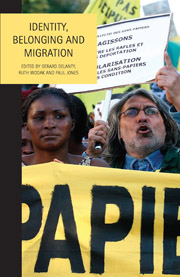Book contents
- Frontmatter
- Contents
- Acknowledgements
- List of Figures
- Notes on Contributors
- Introduction: Migration, Discrimination and Belonging in Europe
- I Theoretical Perspectives on Belonging
- 1 Belonging and European Identity
- 2 Identity, Belonging and Migration: Beyond Constructing ‘Others’
- 3 ‘Us’ and ‘Them’: Inclusion and Exclusion – Discrimination via Discourse
- 4 Dilemmas of Secularism: Europe, Religion and the Problem of Pluralism
- II Institutional Forms of Discrimination
- III Cases of Belonging and Exclusion
- Conclusion: Discrimination as a Modern European Legacy
- Index
4 - Dilemmas of Secularism: Europe, Religion and the Problem of Pluralism
from I - Theoretical Perspectives on Belonging
- Frontmatter
- Contents
- Acknowledgements
- List of Figures
- Notes on Contributors
- Introduction: Migration, Discrimination and Belonging in Europe
- I Theoretical Perspectives on Belonging
- 1 Belonging and European Identity
- 2 Identity, Belonging and Migration: Beyond Constructing ‘Others’
- 3 ‘Us’ and ‘Them’: Inclusion and Exclusion – Discrimination via Discourse
- 4 Dilemmas of Secularism: Europe, Religion and the Problem of Pluralism
- II Institutional Forms of Discrimination
- III Cases of Belonging and Exclusion
- Conclusion: Discrimination as a Modern European Legacy
- Index
Summary
The question of the place and role of religion in modern secular societies has been a subject of much discussion in scholarly debates. Sociologists of religion have noted the increasing secularization of modern societies in terms of the separation of church and state and have noted the overall declining importance of religious belief and practice. Although the so-called secularization thesis has been much debated, since much of the decline of religion in fact amounted to the privatization of religious belief, there does appear to be widespread agreement that modernity entails the overall decline of religion (Bruce 1996; Norris and Inglehart 2004). This is not the place to enter into a detailed discussion of the secularization thesis, but it can be noted that the secularization of religion does not amount to the disappearance of religion. To take an obvious example, the USA is a highly secular society in terms of the role of religion in the state and the Constitution of the Unites States of America is one of the most secular constitutional documents in existence. However, American society is highly religious and there is in addition a certain cultural stream commonly referred to as civil religion, a sense of nationhood that has many features of religious worship (Casanova 1994, 2001; Madsen et al. 2002). In much of Asia and in most parts Africa, religion has become highly important to rapidly modernizing post-industrial countries that did not undergo a European-style reformation where major doctrinal change occurred before industrialization.
- Type
- Chapter
- Information
- Identity, Belonging and Migration , pp. 78 - 97Publisher: Liverpool University PressPrint publication year: 2011

